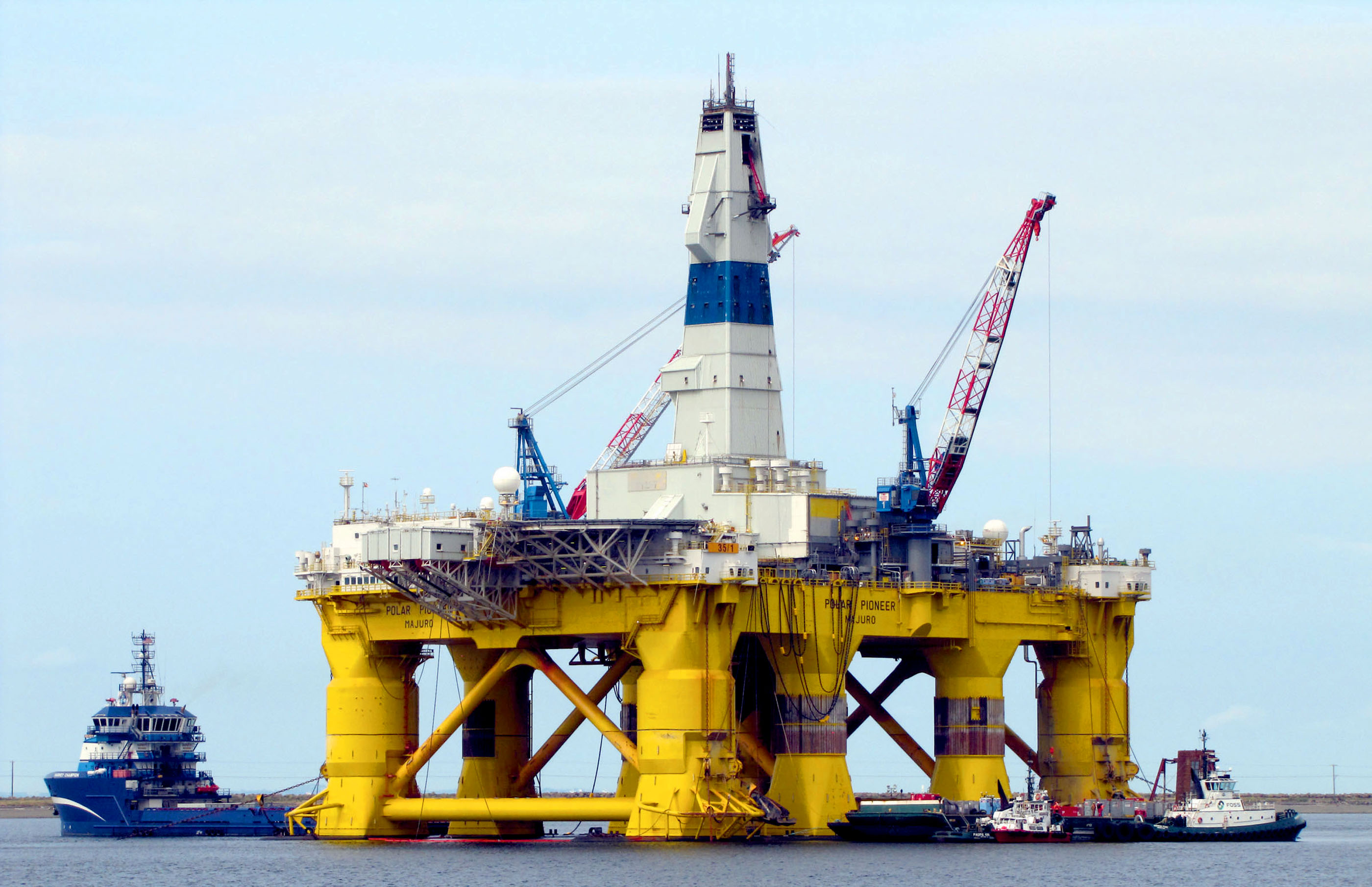PORT ANGELES — The Polar Pioneer — the giant floating oil rig anchored in Port Angeles Harbor since April 17 — will be towed by tug to Seattle this week, Shell Oil Co. announced Monday.
The 400-foot-long apparatus will be brought to Seattle despite a code interpretation by Seattle Mayor Ed Murray and a city planning agency that a Port of Seattle terminal is not permitted to host such a rig.
“The Polar Pioneer is scheduled to arrive at [Seattle] Terminal 5 later this week,” Megan Baldino, Shell spokeswoman, told the Peninsula Daily News on Monday.
Once there, Foss Maritime of Seattle will prepare the massive semi-submersible rig for an expedition to the Arctic Ocean.
The vessel is one of two drill rigs being leased by Royal Dutch Shell, the parent company of Shell Oil Co., slated to be used this summer for exploratory drilling in the Chukchi Sea off Alaska’s northern shore.
The federal Bureau of Ocean Energy Management on Monday approved the multiyear exploration plan in the Chukchi Sea for Shell after reviewing thousands of comments from the public, Alaska Native organizations and state and federal agencies.
The second rig, the Noble Discoverer, is scheduled to bypass the North Olympic Peninsula early this morning and will arrive in the Port of Everett sometime today, said Coast Guard spokesman Lt. Dana Warr and confirmed by Lisa Lefeber, Port of Everett director of public affairs.
Contrary to previous media reports, the Noble Discoverer also will be sent to Seattle’s Terminal 5 to meet up with the Polar Pioneer before both travel north and be in position in June, Baldino said.
The Polar Pioneer had been scheduled to leave Port Angeles Harbor last week.
But its departure was delayed after Murray on May 4 — citing a recent Seattle Department of Planning and Development code interpretation — said that the Port of Seattle must apply for a new permit before it can host the oil rigs.
Murray said he is an opponent of renewed oil drilling in Alaska’s Chukchi Sea.
Greenpeace and other environmental organizations are planning a large protest in Seattle this weekend.
Shell Oil Co., is proceeding with its original plans to moor at Terminal 5 despite the code interpretation and this weekend’s protest.
“As for Seattle, none of the parties involved, including Foss and the Port of Seattle, shares the city’s interpretation of how Terminal 5 can be used,” Baldino said.
“Furthermore, we view our contract and the supporting lease Foss has with the port as valid.”
Murray “expects the Port of Seattle to obtain all required city permits for Terminal 5,” Jason W. Kelly, city of Seattle press secretary, told the PDN in response to Shell’s announcement.
“Seattle’s economic future must include vibrant maritime and industrial businesses, but the mayor does not believe that this short-term lease for maintenance of offshore oil drilling rigs is in line with our community’s environmental priorities.
“Together, the port and the city should be working to create high-paying jobs in the economy of the future, not the fossil fuel industries of the past.”
Port of Seattle commissioners are expected to discuss the permitting process at a meeting today.
“We’ll continue to monitor the actions of all interested parties in the coming days, and if we decide to change our plans, we’ll make that call,” Baldino said.
“But for now, the plan is to move the rigs and begin loading them out in the days ahead.”
After the summer drilling season in the Arctic is over, plans call for both oil rigs to return to Terminal 5, where they would be at anchor for at least six months during the winter.
Shell’s drilling plan is to drill up to six wells within the Burger Prospect, located about 70 miles northwest of the village of Wainwright, Alaska.
The wells would be drilled in about 140 feet of water by the Polar Pioneer and Noble Discoverer. Each vessel would provide relief-well capability for the other.
Shell has said the two rigs will leave the Chukchi Sea at the end of each drilling season.
Arctic offshore reserves are estimated at 26 billion barrels of recoverable oil and 130 trillion cubic feet of natural gas, according to U.S. Geological Survey estimates.
“We have taken a thoughtful approach to carefully considering potential exploration in the Chukchi Sea, recognizing the significant environmental, social and ecological resources in the region and establishing high standards for the protection of this critical ecosystem, our Arctic communities, and the subsistence needs and cultural traditions of Alaska Natives,” federal Bureau of Ocean Energy Management Director Abigail Ross Hopper, said in a statement.
Environmental groups Monday blasted the approval.
“This decision places Big Oil before people, putting the Arctic’s iconic wildlife and the health of our planet on the line,” said Erik Grafe, an attorney for Earthjustice.
But before Shell can begin drilling this summer, the company must still obtain other permits from state and federal agencies that find the company can comply with terms and conditions of the Endangered Species Act.
Activists plan to protest the movement of the Polar Pioneer with a so-called “festival of resistance” starting Saturday.
It will include protesters on land and in kayaks and inflatable boats trying to block the vessels’ movements.
“We respect the choice that anyone might make to protest based on Shell’s Arctic aspirations,” Shell spokesman Curtis Smith said.
“We just ask that they do so safely and within the boundaries of the law.”
The Coast Guard said it will enforce a 500-yard safety buffer around the moving oil rigs, as it did when the Polar Pioneer arrived in Port Angeles Harbor last month.
________
The Associated Press in Seattle and Anchorage, Alaska, contributed to this report.
Sequim-Dungeness Valley Editor Chris McDaniel can be reached at 360-681-2390, ext. 5052, or cmcdaniel@peninsuladailynews.com.

